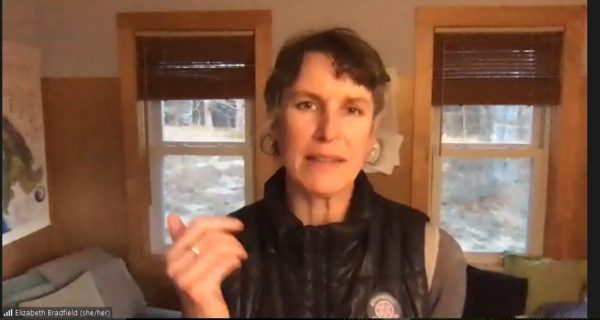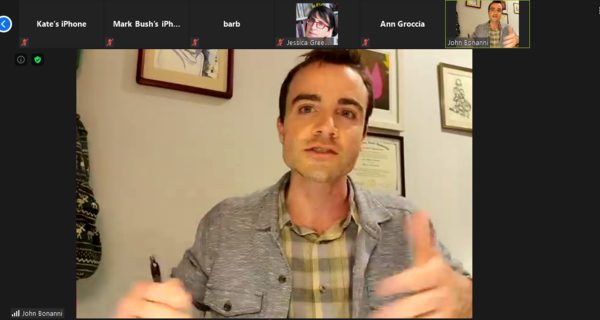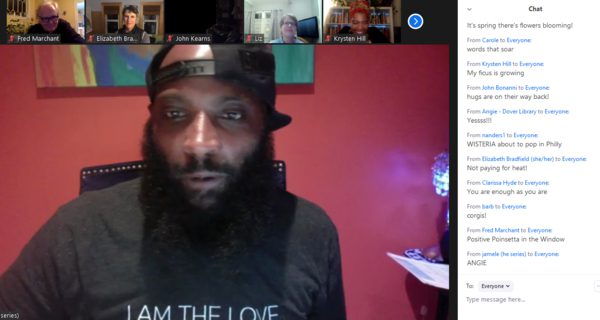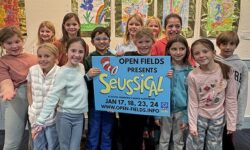Slam poet Jamele Adams asked the crowd to fill the chat section with anything positive that was happening in their lives.
By James Kinneen
Hometown Weekly Reporter
In celebration of National Poetry Month, on Wednesday night, the Dover Town Library invited six local poets, Fred Marchant, Elizabeth Bradfield, John Bonanni, Catherine Staples, Jeffrey Harrison and Jamele Adams, to read some of their work over Zoom. But while their relative geographic homogeneity might have you expecting their poetry would be about similar topics, the night instead featured themes as varied as police shootings and the AIDS epidemic to right whales and snowed in mailboxes.
First up was Fred Marchant, the director of the creative writing program at Suffolk University. Fresh off a talk to a Pennsylvania college about William Stafford, a writer who served as a conscientious objector during World War II (Marchant himself was a Marine turned conscientious objector during Vietnam), Marchant read from his poem, “Trout”, which was about the first letter he wrote Stafford decades ago, and Stafford’s reply.

Elizabeth Bradfield had a personal connection to the event. She was a former college professor of Dover Librarian Angela Howes, who was running the event, and noted she’s always happy to see former students who “I’ve loved, admired, and who I’ve been a witness - and hopefully a goad - to their creative process.” But while Bradfield is a professor and poet, it’s her work as a naturalist on Cape Cod that inspired her poetry about the endangered right whale. After giving a brief overview of the animal by explaining it’s called the “right” whale because it was seen as the right whale to hunt, and talking about what it eats (zooplankton, which she humorously explained “if you’ve seen Spongebob, you’ve seen them”) she read from her poem “Historic Numbers of Right Whales Skim Feeding off Cape Cod.” The poem read, in part: “Week after week, right whales/eat the bay down/until they have to leave it./Time and proximity have made them/monsters. This must be how it was before.” Other poems compared deep space to the ocean, while another was inspired by “Touch Me” by Stanley Kumitz, which she said she “hopes everyone’s furiously Googling, now that I’ve mentioned it.”
Also based out of Cape Cod, large swaths of John Bonanni’s work were also based on other writing, but less fiction and more things like the obituary of Victoria Chang and transcripts of interviews with AIDS patients. Bonanni explained that before COVID hit, he was already writing about that pandemic, but that COVID had an effect; his manuscript now oscillates between both. He wrote a poem about his research that found an HIV positive man named Mark Harrington who explained how members of civilian committees devoted to finding drug treatments had a “drug buddy” system where committee members selected a drug to research, tell scientists about, and promote for FDA approval. Bonanni’s poem, “Drug Buddy for Mark Harrington” instead imagined the drug as an actual buddy of Harrington’s, beginning with the evocative line “Take my hand little dextran sulphate.”

While she also mentioned the Cape, much of Mary Catherine Staples’ work had a Dover connection, as she grew up here (though she now lives in Pennsylvania). She talked about how there was a rule in Dover that you couldn’t skate on the Charles River, but that her brother was always on Channing Pond playing “crack the whip.” Many of her poems were inspired by her brother’s death, and reflections on events like a Vespa ride with him.
Jeffrey Harrison’s work is largely inspired by Dover, because he still lives here. His poetry touched on things like learning to glaze a window (which he used as a metaphor for making poetry), and what snow, ice dams and plows do to the mailboxes around town.
The last poet was Jamele Adams, who also goes by the name Harlym 1Two5 as a slam poet. After asking everyone involved to flood the chat with anything positive going on in their lives, and noting how violent things like fist bumps and elbows have become the way we say hello in a post-COVID world, he played a YouTube video of him reciting a poem about shootings from a street corner in Lynn. It was one of the few poems that had a rhyme scheme, with lines like “imagine pulling out your wallet and getting shot, imagine using your cell phone and getting shot, imagine jogging and getting shot,” before ultimately ending with: “can you imagine a place where you can go, and not get shot? I cannot.”

























